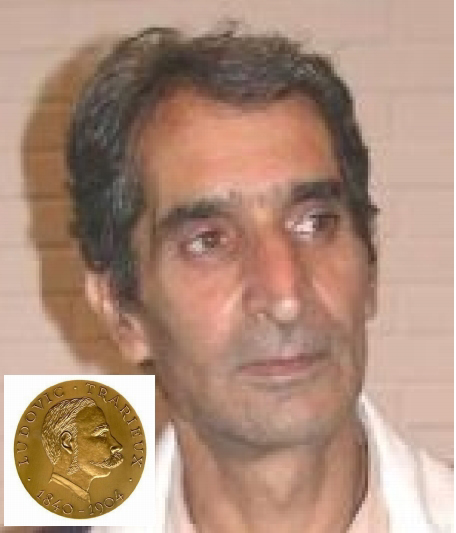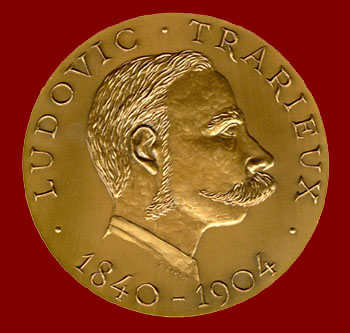Ludovic Trarieux Historical Account The Prize 2000 The Prize 2002 The Prize
2003 The Prize 2004 The
Prize 2005 The Prize 2006 Livre d'Or
Prix International des droits de l'homme Ludovic-Trarieux
2006
Ludovic-Trarieux International Human Rights Prize 2006
Premio Internacional de Derechos Humanos Ludovic Trarieux 2006
Internationalen
Ludovic-Trarieux-Menschenrechtspreis 2006
Prêmio Internacional de Direitos Humanos Ludovic Trarieux
2006
Premio Internazionale
per i Diritti Umani Ludovic Trarieux 2006
Ludovic Trarieux Internationale
Mensenrechtenprijs 2006
“The award given by lawyers to a lawyer
”

 Parvez IMROZ
Parvez IMROZ
Ludovic Trarieux Internationale Mensenrechtenprijs
2006
Tijdens
de bijeenkomst van 2 juni
in het Brussels Hooggerechtshof heeft
de jury de mensenrechtenactivist Parvez
Imroz aangewezen als de prijswinnaar van de IXde
editie van de prestigieuze
Ludovic Trarieux Prijs. Het IKV feliciteert
Parvez Imroz met deze belangrijke prijs. De toekenning van deze prijs drukt een
grote mate van internationaal
respect uit voor het werk van Parvez Imroz. De prijs is van grote morele
waarde voor deze mensenrechtenactivist die actief is in een gebied waar angst dikwijls wordt ingezet als succesvol
wapen om dappere mensen de mond te snoeren. De
Ludovic Trarieux Prijs wordt
elk jaar uitgereikt door het Instituut voor de Rechten van de Mens van Europese Advocaten (IDHAE). De Ludovic Trarieux Prijs
is een internationale mensenrechtenprijs in herinnering
aan de Franse advocaat Ludovic Trairieux, die
de Franse Stichting ter het
Bescherming van Mensenrechten
oprichtte tijdens de
Dreyfus affaire in Frankrijk. Diegene die de eerste prijs in ontvangst nam was Nelson Mandela, in 1985, toen
nog in gevangenschap. Meer informatie treft u op de websites www.ludovictrarieux.org, www.idhae.org en
www.idhbb.org.
De mensenrechtenactivist Parvez Imroz was genomineerd voor deze prijs in maart
2005 door de Nederlandse sectie van Advocaten zonder Grenzen. Deze sectie is
een partnerschap aangegaan met de Kashmiri Advocaten
voor Mensenrechten (KLHR), waar Parvez voorzitter
van is. Kortgeleden bezocht een delegatie
van Advocaten zonder Grenzen en het IKV de KLHR in Srinagar. Een verslag van dit
bezoek zal eerdaags verschijnen.
The
following was the list of the Jury for 2006 : : Bâtonnier
Bertrand Favreau, Président, Bâtonnier
John Bigwood (Bruxelles), Bâtonnier Henri Ader (Paris),
President Woijciech Hermelinski
( National Polish Bar Council Warsaw), Bâtonnier
Manuel Ducasse (Bordeaux), President Mario Lana
(Roma), President Lucy Winskell (Law Society of
England and Wales - London), Präsident Bernd Haüsler (Rechtsanwaltskammer
Berlin), Bâtonnier Robert De Baerdemaeker
(Brussels), Bâtonnier Georges-Albert Dal (Brussels),
Christophe. Pettiti IDHBP (Paris), Julia Bateman
(London), Brigitte Azema Peyret,
(Bordeaux), Hélêne Szuberla,
(Bordeaux), Nicole Dehry, IDHBP (Paris), Isabelle Huet, IDHBP (Paris), Marie-France Guet,
IDHBP (Paris), Reginald de Beco (Brussels), Raymond Blet, (Bordeaux), Philippe Froin,
(Bordeaux), Frédéric Krenc
(Brussels)
Zie ook de website
van de organisatie van Parvez
Imroz, de Jammu & Kashmir Coalition of Civil
Society in Srinagar, Kashmir: www.jkccs.org .
Parvez Imroz is a human rights lawyer and a civil
rights activist in Srinagar, the capital of Jammu and Kashmir. He graduated in
Science from Srinagar in the year 1972 and then got his LLB degree at the Law College
Aligarh Muslim University in 1975. Imroz joined the
J&K High Court as a lawyer in 1978.
Since the end of the eighties, he has initiated and led campaigns for
human rights in a context of grave violations, including killings, tortures and
rapes, or forced "disappearances" with impunity. He is founder and
President of the J&K Coalition of Civil Society (JKCCS) that works to build local
alliances between Kashmiri civil society groups.
In response to the large
volume of parents at the Jammu and Kashmir High court who were filing or
pursuing habeas corpus petitions, Imroz founded in
1994 the Association of Parents of Disappeared Persons (APDP), which brings
together hundreds of Kashmiri families whose members have been the victims of
Enforced or Involuntary Disappearances (EID). The APDP is a collective
campaigning organization that seeks truth and justice on this human rights
issue in Kashmir. The APDP is not a human rights group but an association of
those suffering by the State’s tactics and they are campaigning for knowing the
whereabouts of their missing relatives. Any person related to a victim of a disappearance could
be a member of the association. The association has no political affiliations
or political positions; it is an independent group seeking justice and
information from the state.
Parvez Imroz has lost four
colleagues in seven years at the hands of the security forces. Imroz's senior partner, H N Wanchoo,
was assassinated in the early 1990s, and on April, 12, 1995, Parvez Imroz was shot when he was
driving home after visiting a friend some eight kilometres from Srinagar. Two
men armed with automatic weapons signalled him to stop. Imroz
sped up, and as he passed beyond them he was hit in the upper left back. He
lost control of the car and stopped in front of a mosque. Someone came out of
the mosque and drove Imroz to the SMHS hospital.
Fragments of AK-56 bullets were found in Imroz's
upper back, and his left lung was damaged. After six days, Imroz
was transferred to a hospital in Delhi, where he remained for fifteen days.
When he returned to Srinagar, several militants of Hezb-ul
Mujahedin apologized for shooting him, claiming that it was a case of mistaken
identity. He was tempted to quit.
One year later, on March
8, 1996, Imroz had tea with another High Court lawyer
specialising in human rights, Jalil Andrabi. Thirty minutes later, Andrabi
and his wife were stopped by a unit of the 35 Rashtriya
Rifles (35RR), an Indian paramilitary force.
On July 18, 2001, Imroz realized his dream, in Srinagar,
he laid the foundation stone of a monument built by the APDP, in memory of
Kashmiri men who have gone missing in the past 12 years of violence. In less
than eight-hours, Indian police razed the foundation.
Parvez Imroz did not resign and founded the Public
Commission on Human Rights (PCHR) that works extensively on the documentation
of human rights violations and the dissemination of the information through its
monthly dossier “The Informative Missive”. The PCHR also provides free legal
assistance to the victims of human rights violations. The PCHR has published a
comprehensive report on Human Rights situation in Kashmir, which includes the
time period of last 16 years. Besides documentation, the commission is
providing free legal assistance to the victims of human rights violations.
Thousands of victims have been benefited from the PCHR’s free legal assistance.
Recently, in April 2003,
Imroz organized a worldwide hunger strike,
coordinated in different cities across the world, pressing for an end to
disappearances, prosecution of perpetrators, and appointment of a commission to
probe into all enforced disappearances. During the hunger strike the APDP
received the letters of solidarity from the civil society groups from India and
abroad.
In March 2004, the
Association of Disappeared Persons organised a protest in Srinagar. Violent
protest demonstrations followed alleged police high- handedness and over a
dozen people, mostly women, were injured. Witnesses said that police targeted
women in a procession by the APDP heading towards the office of the
United Nations who were demanding for the fate of their relatives who had gone
missing in police custody during the last 13 years. Soon after the procession
started from the APDP office, police used force to disperse it. Over a dozen
women and the APDP patron, Parvez Imroz,
were injured. Later police arrested 10 women and Parvez
Imroz and they remained in custody for 7 hours.
On April 30, 2005 Imroz came out with a statement that he is receiving death
threats from an unidentified man he
called a government-sponsored gunman who came to his house at Kralpora area and that the Indian army and the Jammu and
Kashmir government are conspiring to kill him.
More on : Parvez IMROZ
De
“International Human Rights Prize Ludovic-Trarieux” is in 1984 ingesteld en wordt
toegekend aan ‘een advocaat, ongeacht
nationaliteit of Balie, die
in de uitoefening van de praktijk
als advocaat dan wel middels
andere activiteiten of zelfs door opofferingen, is opgekomen voor de verdediging van mensenrechten, zich sterk gemaakt
heeft voor de rechten van de verdediging, de suprematie van het recht en gestreden heeft
tegen racisme en intolerantie in welke vorm dan
ook.
Het is
de oudste en meest prestigieuze prijs die toegekend wordt aan een advocaat,
die teruggrijpt op de boodschap
van de Franse advocaat,
Ludovic Trarieux, oprichter in
1898, ten tijde van de
Dreyfus- affaire, van de “Liga voor de Rechten van de Mens en
Burger”:
“ Het gaat niet alleen om de verdediging van de individuele zaak van één persoon, maar om het groter belang van de verdediging van het recht, de rechtvaardigheid en de menselijkheid.
“
Een jaar
na de instelling van de prijs,
werd de eerste prijs op 27 maart 1985 toegekend aan Nelson Mandela, die
dan al sinds 23 jaar gevangen zit in Zuid-Afrika.
De prijs
werd uitgereikt aan zijn dochter,
Zenani Mandela Dlamini, op
27 april 1985 in aanwezigheid
van 40 voorzitters van Europese
en Afrikaanse Balies.
Het was de eerste
prijs die Mandela in Frankrijk
ontving en de eerste prijs in de wereld die door advocaten aan een advocaat
wordt gegeven.
Vijf jaar later, op 11 februari 1990, werd Nelson
Mandela vrijgelaten. Vanaf die datum wordt de prijs opnieuw toegekend.
Sinds 2003 is de prijs
uitgegroeid tot een jaarlijks eerbetoon van advocaten aan een
advocaat van over de hele wereld.
In gezamenlijk
overleg bepalen de Instituten voor de Mensenrechten van de Balies
Bordeaux, Brussel en Parijs, de Unione forense per la tutela dei dititti dell ‘uomo (Rome), de Rechtsanwaltskammer de Berlin, de Balies
van Amsterdam en Luxemburg, de Orde van Advocaten van Genève en de Union Internationale des Avocats
(UIA) en het Institut des Droits de l ‘Homme des Avocats Européens (IDHAE) aan welke advocaat de prijs wordt toegekend.
De
uitreiking vindt bij toerbeurt plaats
in één van de steden waar deze Balies
of instituten gevestigd zijn.
© www.ludovictrarieux.org
|
|